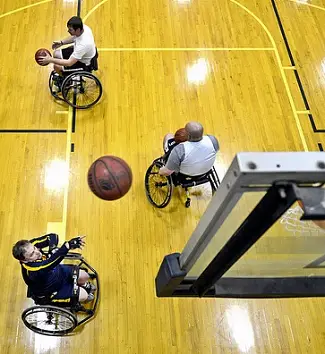Disability Vocabulary: Overcoming Limitations
Practice disability vocabulary by reading and listening to ways people have overcome their limits, then putting words into categories and then matching words and their meanings.

There are many inspiring stories online about people who have reached their goals in spite of major disabilities, as well as news about new treatments and assistive devices to help people achieve their goals and live well in spite of their limits.
On this page I have linked to a few of the best, illustrating several different disabilities and recent advances in treatment. Most of these have fairly simple English, though the NPR interview and article are longer and more challenging.
I would suggest starting with a short (under 10 minute) TED talk on “Living Beyond Limits” by a young woman who kept her dreams alive—and even enlarged them-- after an infection that led to amputation (surgical removal) of her lower legs. (The link is to the page with a transcript, so you can read along as—or after—you listen.)
If you don't know some of the words related to disabilities, you can do the matching exercise first. (Just guess ones you don't know-- it's not a test!) Then check the answers for simple definitions of the most common words.
Then read about a woman who helped her brother deal with blindness—and ended up helping over 4,000 disabled people in India find jobs.
If you can read English at an intermediate level or above, try this interview from NPR (National Public Radio). It’s a talk with a man who lost his lower legs from frostbite (damage from extreme cold) in a bad storm while mountain climbing. He has not only returned to mountain climbing, but helps design better prostheses (artificial limbs) for other people.
You can listen to it, and read a related story, as well as the transcript of the interview, using the link above. It is long, and has some more difficult words, but you can understand the main idea even if you miss some of the harder words.
There are two more TED talks that are easy English and well worth listening to if you are interested in more stories about overcoming limitations and reaching out to help others.
Carolyn Casey talks about how she learned to not be limited by near-blindness. Alberto Cairo tells about developing rehabilitation services, in the midst of war, for people disabled by the fighting in Afghanistan.
These stories demonstrate that people who have disabilities do not have to let them control or limit their lives. With imagination, determination, and help they can still achieve many of their dreams and contribute to their communities—sometimes in a greater way than if they had not had to deal with limitations.
Practice Disability Vocabulary
Classify these words by the ways they can be used: (Put them into the four groups below the list. Just write them in groups on a piece of paper, and check your answers at the bottom of the page.)
accident, amputate, amputation, assist, assistance, assistive, bionic, blind, blindness, design, disabled, disability employ, employed, employment, enable, imagine, impaired, impairment, injure, injured, injury, innovate, job, limit, limitations, paralysis, paralyzed, physical, prosthesis, prosthetic, rehabilitate, rehabilitation, visual. (These are not all the possible forms of these words.)
nouns- problems
nouns for kinds of help
adjectives
verbs (what people can do)
Match these Words with their Meanings (on the left)
To practice related words, see Medical Vocabulary (including a lot of words for treatments) or Nervous System Vocabulary (examples and a crossword puzzle.)
Home> Vocabulary Games > Disability Vocabulary
Disability Vocabulary Classification Answers
nouns- problems
accident
amputation
blindness
disability
impairment
injury
limitations
paralysis
nouns for kinds of help
assistance
employment
job
prosthesis
rehabilitation
adjectives
assistive
bionic
blind
disabled
employed
impaired
injured
paralyzed
physical
prosthetic
visual
verbs (what people can do)
amputate
assist
design
employ
enable
imagine
injure
innovate
limit
rehabilitate
Didn't find what you
needed? Explain what you want in the search box below.
(For example, cognates, past tense practice, or 'get along with.') Click to see the related pages on EnglishHints.
| site search by freefind | advanced |





